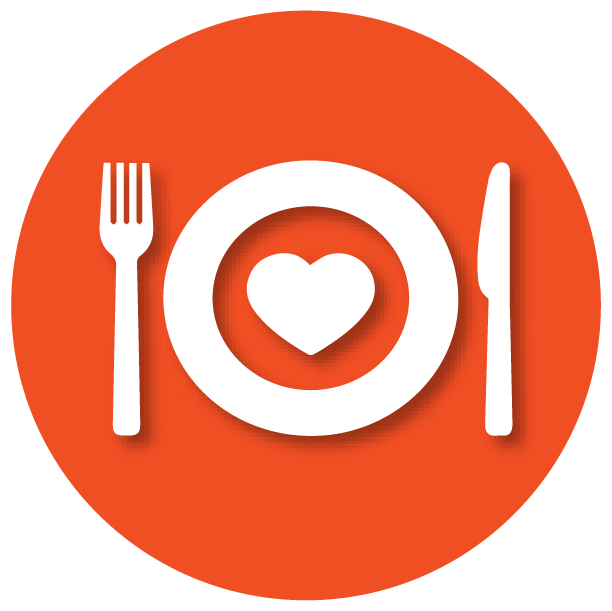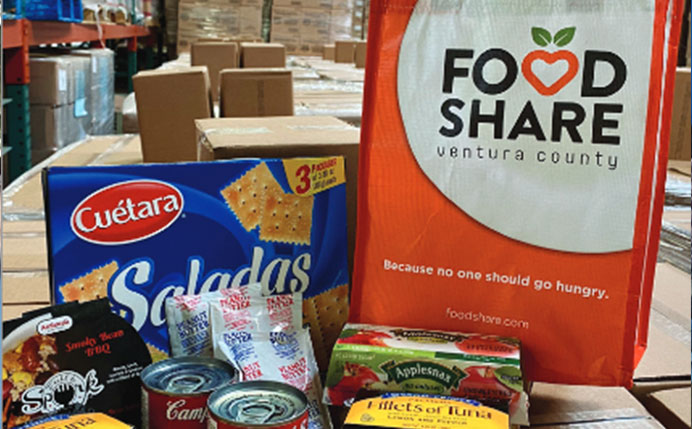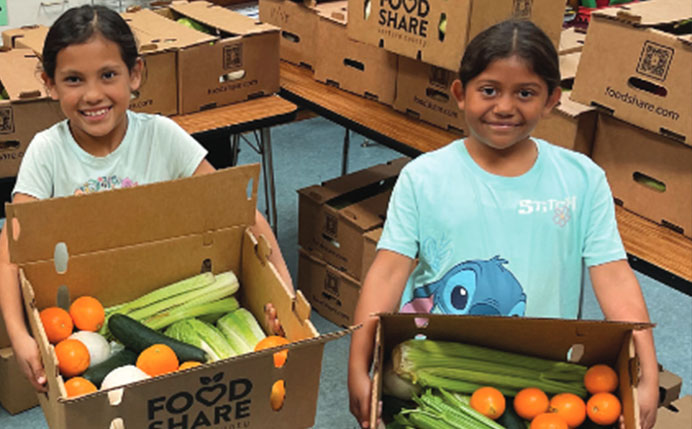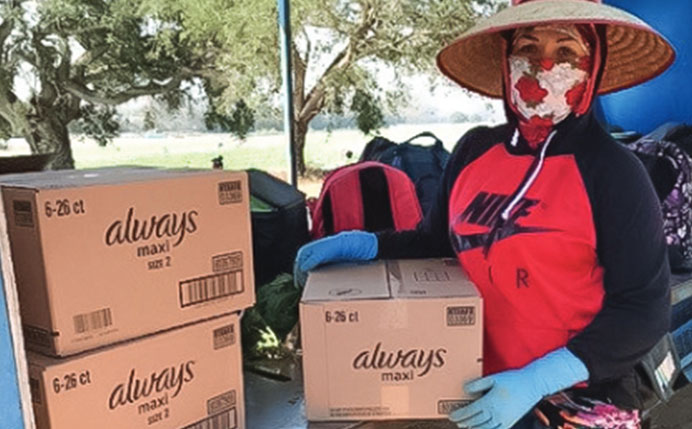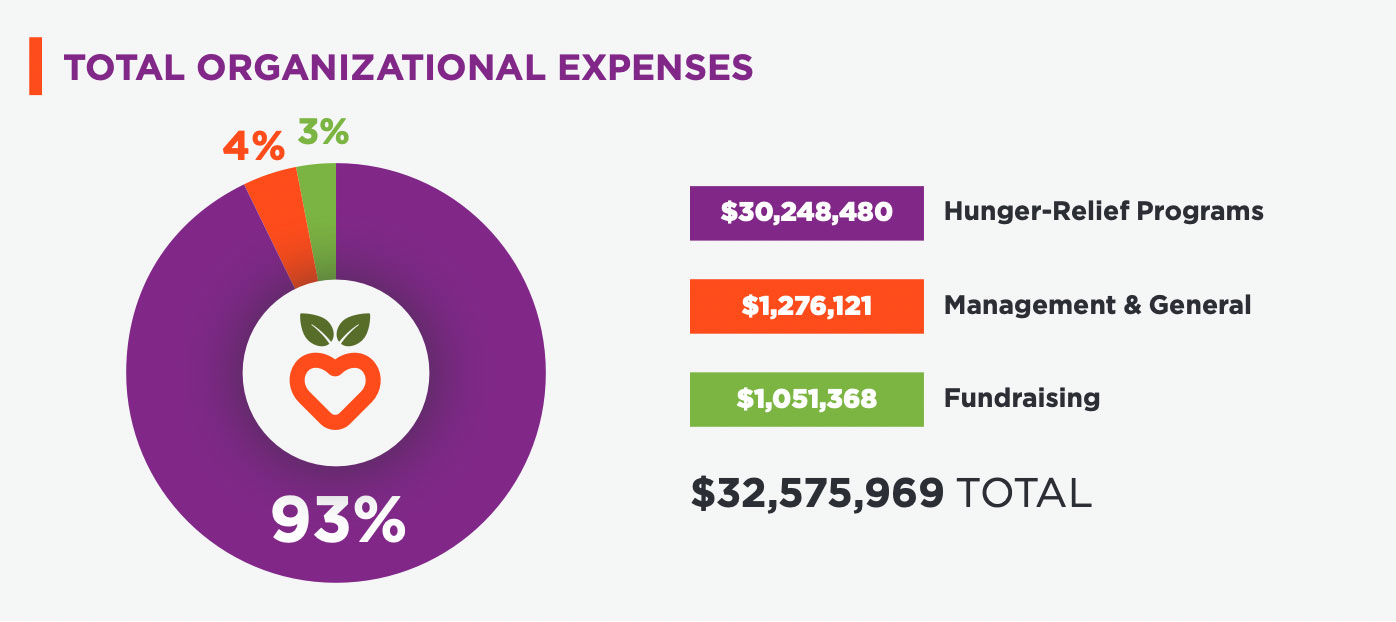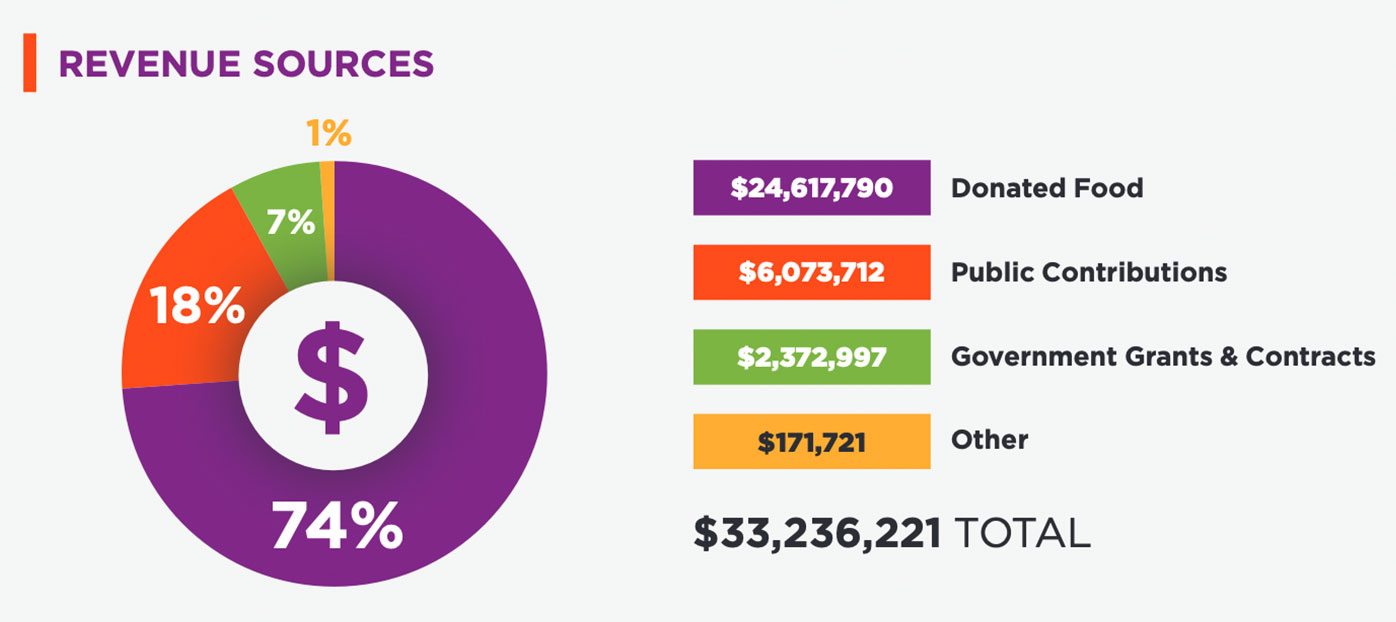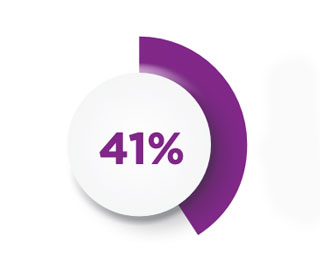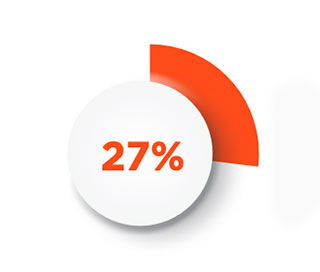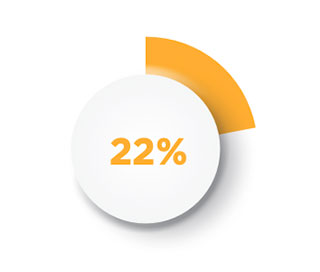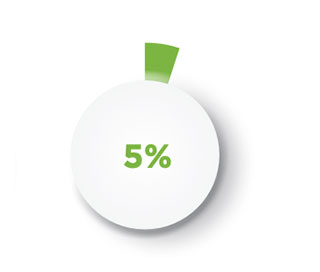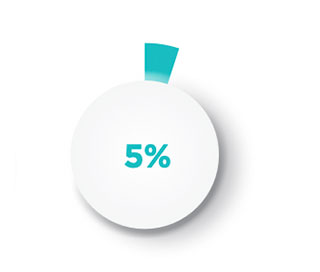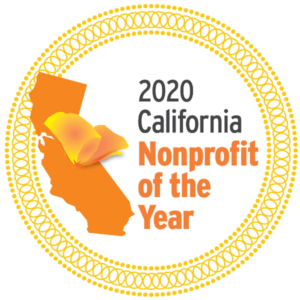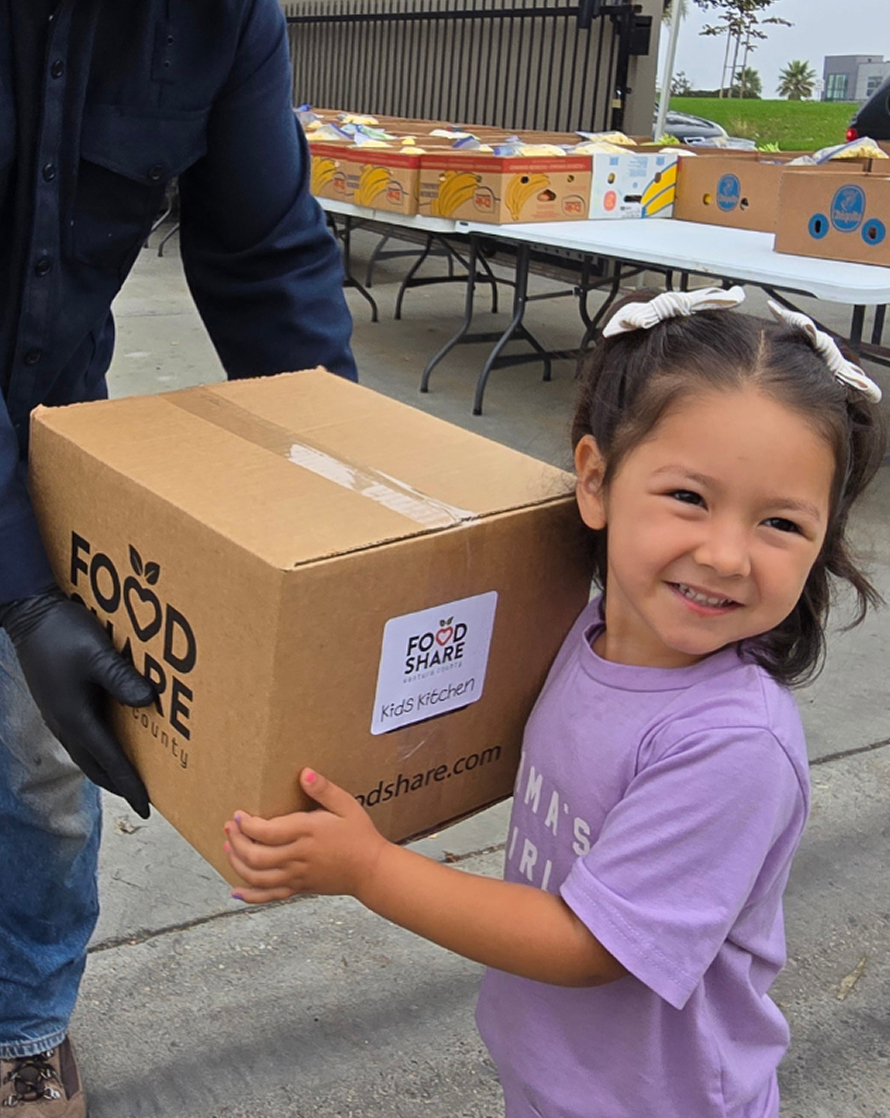Fiscal Year 2021-22
Annual Impact Report 2022
Letter from Monica White
Dear Friends,
Thank you for your support of Food Share of Ventura County. Much of last year’s 2020-21 annual report was, inevitably, focused on the impact of the COVID-19 pandemic on our community and the extraordinary rise in need. We assumed then, perhaps naively, that the pandemic would subside and the economic pressures would lessen during the 2021-22 fiscal year. Unfortunately, as we all now know, that was not to be, and food insecurity remains significantly elevated above 2019-20 pre-COVID levels.
In the past year, high inflation has exerted the greatest pressure on our food insecure friends and neighbors. None of us have been immune to the sticker shock we’ve all experienced at the grocery store, gas station and even with our home utility bills. While some are in a position to absorb the price increases, for thousands, the choice between paying rent, paying bills and putting food on the table continues to be a stressful daily struggle.
Fortunately, with the support of donors, volunteers, our hunger-relief network of community partners, and our passionate and dedicated staff, we’ve been able to sustain and even expand our efforts to ensure that no one in Ventura County goes hungry. In 2021-22 we provided food for 237,009 people. That’s a staggering 1 in 4 people in Ventura County.
People are often ashamed to admit they’re having a tough time putting food on the table. With many of our friends and neighbors seeking our assistance, it’s clear that hunger in our community is no longer an issue hiding in the shadows – it’s an ever-present reality for too many. As we look to the future, that means continuing to increase the number and scale of our programs, expanding our operational infrastructure to meet the need for the long term, and continuing to grow our family of supporters like you. With the generosity and commitment of the people of Ventura County, we can and will lead the fight against hunger.

Monica White
PRESIDENT & CEO
Leading the fight against hunger in Ventura County, because no one should go hungry.
Feeding the Line.
Emergency Food Box Distributions
Food insecurity is a pressing public health issue. Countless studies have shown the impact that poor nutrition and food insecurity has on mental and physical health, children’s academic performance, and seniors’ ability to remain active and independent. Food Share’s work is critical to providing a healthy future for thousands of people in Ventura County.
Never has this been more true than during the past three years as the number of people seeking assistance skyrocketed. At the outset of the COVID-19 pandemic, to cope with the increased demand coupled with the closure of a quarter of Food Share’s network of community pantries, the organization began running “pop-up” emergency food box distributions.
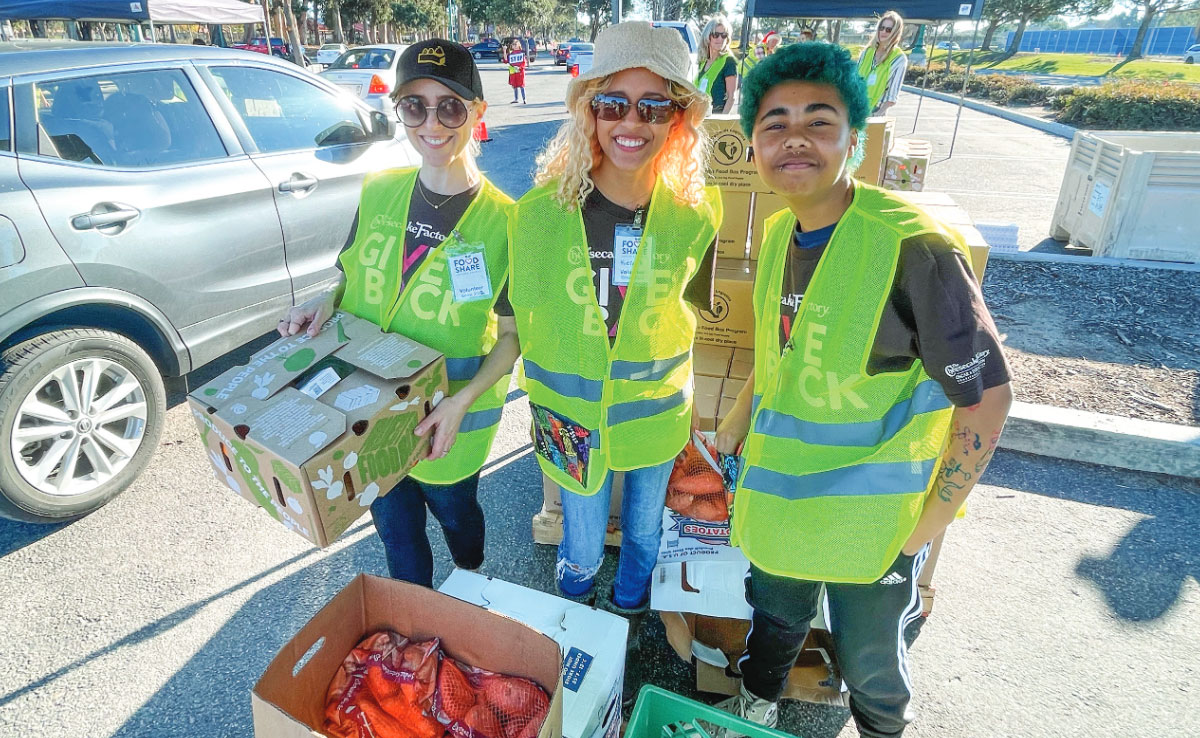
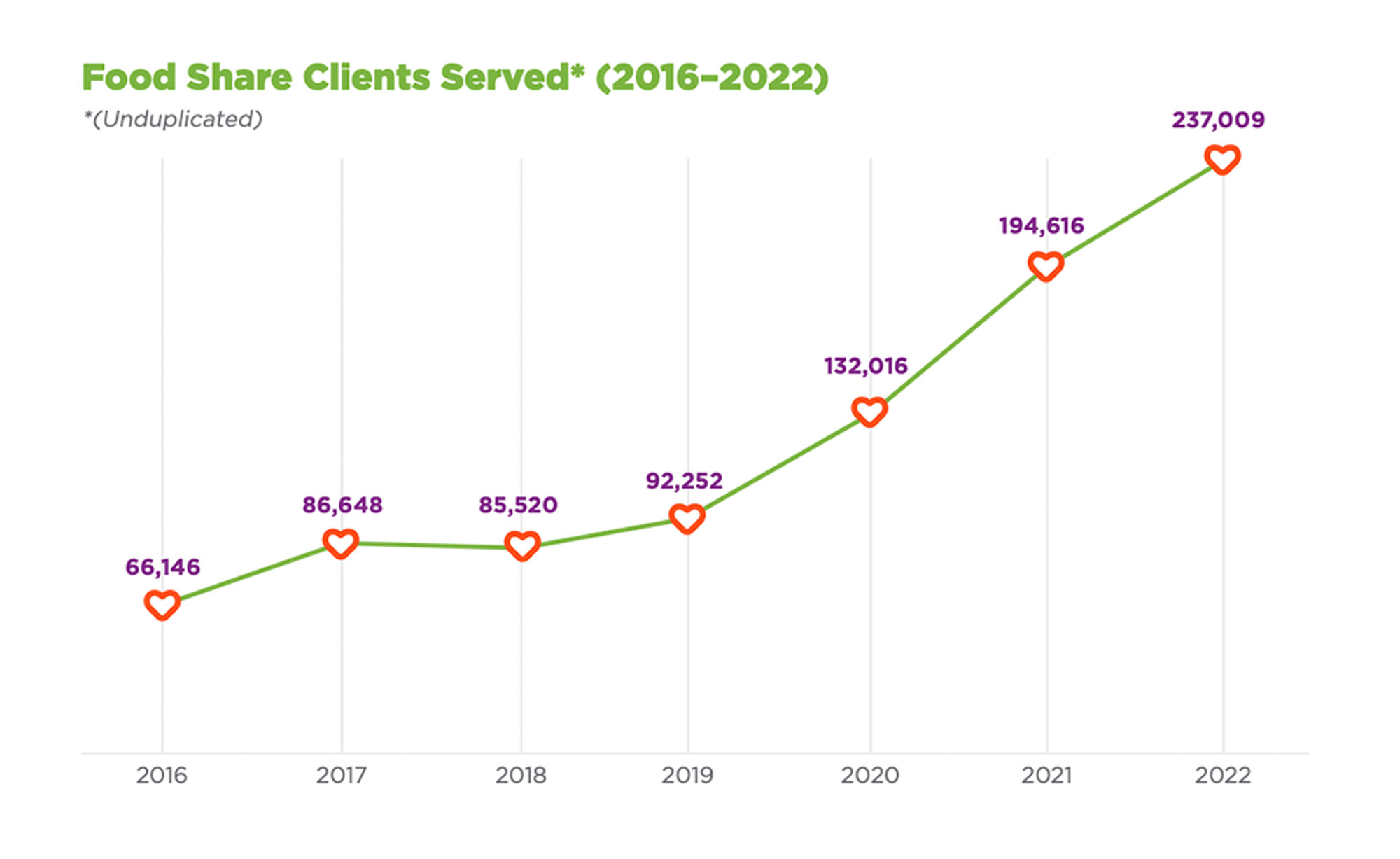
The boxes contain shelf-stable pantry items like rice, pasta, peanut butter, and canned proteins such as chicken and tuna, and are accompanied by a bag of seasonal fresh produce. When available, milk, cheese, and protein are also distributed. Initially, the expectation was that the distributions might be needed for a few weeks, but those weeks quickly turned into months, and those months into years.
Between July 1, 2021 and June 20 2022, Food Share provided emergency food boxes at 318 distribution locations throughout Ventura County. The biggest of these, a weekly event at College Park in Oxnard, continues to draw between 900-1,200 cars each week, serving approximately 4,500 individuals.
Food Share's Impact
By the Numbers
Pounds of Food Distributed
Equivalent # of Meals Provided
# Total People Served
28.2%
% of Country Population Served
# Children 0-17 Served
# Seniors (60+) Served
Emergency Food Boxes Distributed
# of Kitchen-Free Bags Distributed
The Hunger Relief Network
To distribute the millions of pounds of food acquired and processed through Food Share, the organization relies on a network of community-based pantry partners, nearly all of which are staffed by dedicated volunteers. Located in medical centers,  schools, places of worship, and senior centers, these pantries operate as important hubs for their local communities. By providing this food at zero cost to the network, Food Share continues to lead the fight against hunger in Ventura County with their powerful support.
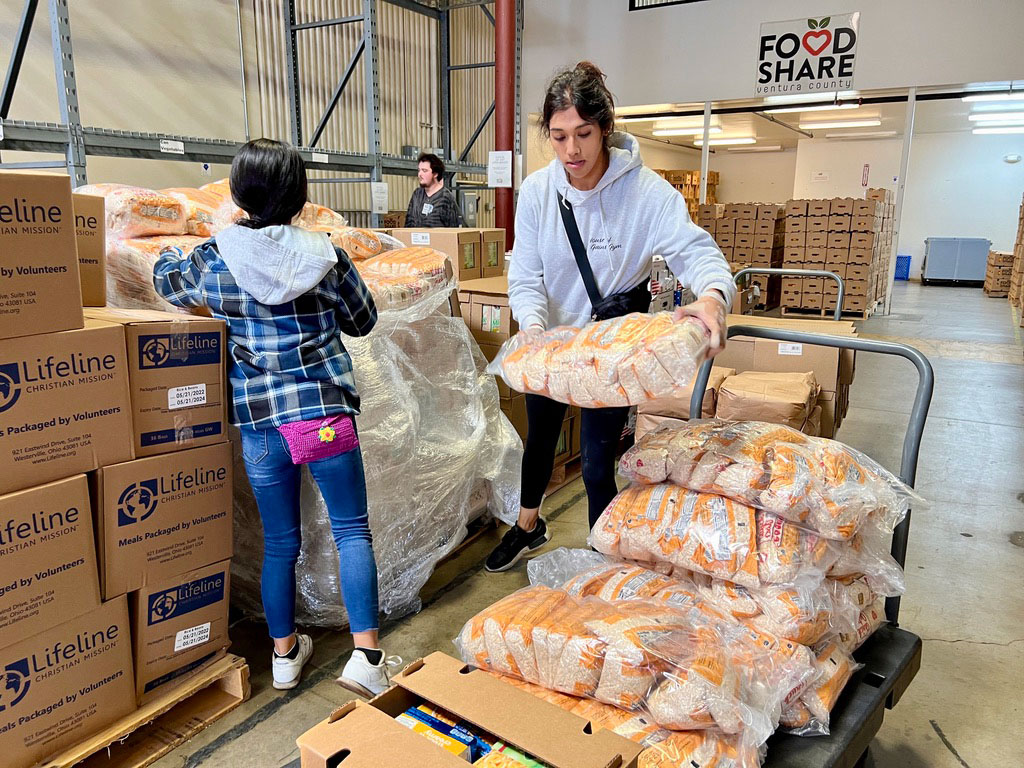
CAMARILLO
- Boys & Girls Club of Camarillo
- Crossroads Church
- Mira Vista Senior Apartments
- Pleasant Valley Senior Center
- Dolphin Pantry @ Cal State Channel Islands
- Faith Mission Christian Fellowship
- Pleasant Valley Community Center
- Project Hope @ St. Columba’s Episcopal Church
- ROAR Church
- Seventh-Day Adventist Church
- St. Mary Magdalen Church Pantry
- Somis Pantry
- Camarillo Community Church
FILLMORE/PIRU
- Bardsdale Church
- Fillmore Central Station
- Fillmore Active Adult Center
- Fillmore Church of Christ
- Fillmore Police Storefront
- Love Without Borders
- One Step a la Vez
- Rancho Sespe
- San Salvador Mission
- Valle Naranjal Farmworker Apartments
MOORPARK
- Boys & Girls Club of Moorpark
- Catholic Charities
- Faith Lutheran Church
- Tafoya Terrace Senior Apartments
- Grace Harvest Ministry
- Ruben Castro Charities
- Moorpark College Pantry
THOUSAND OAKS/NEWBURY PARK
- Conejo Community Outreach (diaper bank)
- The Lighthouse Church
- Newbury Park First Christian Church
- Nucleus
- St. Vincent de Paul @ St. Julie Billiart Church
- The Fellowship House
- Adelante Comunidad
- Boys & Girls Club of Conejo Valley
- Christian Church of Thousand Oaks
- Seventh-Day Adventist Church
- Many Mansions
- PathPoint
- Safe Passage Youth Foundation
- United Methodist Church of Thousand Oaks
OJAI/OAK VIEW
- Oak View Teen Center
- Secure Beginnings (diaper bank)
- Help of Ojai
- Life Choices Pregnancy Clinic
- St. Thomas Aquinas Church
OXNARD
- Bethel AME Church
- Boys & Girls Club of Greater Oxnard and Port Hueneme
- Bread of Life – All Saints Episcopal Church
- Celebration Nation
- Channel Islands Vineyard Church
- Colonia Village Tenant Association
- Community Action of Ventura County
- Camino del Sol Senior Apartments
- Camino Gonzalez
- Church of the Nazarene
- First Bible Church of El Rio
- Food Share Warehouse
- Gabriel’s House
- Genesis Programs
- Grace Bible Church
- Graceful Diapers
- Harbor Missionary Church
- Heritage Park Senior Apartments
- Lighthouse for Women and Children
- Lucha Pantry @ Southwinds
- Mary Star of the Sea
- Mixteco Indigena Community Organization
- New Life Community Church
- Nyeland Promise
- Our Lady of Guadalupe
- Oxnard Alano Club
- Oxnard Community Food Pantry
- Oxnard PAL Center
- Pacific Point Senior Apartments
- Palm Vista Senior Housing
- Paseo Del Rio
- Project Access
- Prototypes Women’s Center
- Reiter Affiliated Companies
- Rescue Mission Alliance
- Rio School District
- Salvation Army Oxnard
- Seventh-Day Adventist Community Health Services
- Seven High Senior Apartments
- Shelter Care Resources
- Sisters, Servants of Mary
- Sonata RHF @ RiverPark
- South Oxnard Senior Center
- St. Anthony’s Church
- St. John’s Health Ministries
- Sycamore Senior Village
- Turning Point Foundation
- UFW Foundation
- Villa Cesar Chavez
- Villa Victoria Apartments
- Westminster Free Clinic
PORT HUENEME
- Beachside Fellowship
- Casa Pacifica Apartments
- Evangelistic Missionary Baptist Church
SANTA PAULA
- Boys & Girls Club of Santa Clara Valley
- Centro Cristiano Emanuel
- Limoneira Farmworker Housing
- Rodney Fernandez Garden Senior Apartments
- The Santa Paulan Senior Apartments
- LUCHA – Poder Popular
- Our Lady of Guadalupe
- SEEAG @ FigTree Farms
- Spirit of Santa Paula
- Valley Community Foursquare
SIMI VALLEY
- Big Brothers Big Sisters
- Boys & Girls Club of Simi Valley
- Centro Familiar Nueva Esperanza
- Church of the Living Christ
- Eagle Vision Outreach
- New Beginnings Christian Fellowship
- New Heart Foursquare Church
- Salvation Army – Care and Share
- Samaritan Center
- SEWA International
- Shepherd of the Valley
- Simi Second Missionary Baptist Church
- Simi Valley Senior Center
- St. Rose of Lima
- Camino Esperanza
VENTURA
- People’s Self-Help Housing
- 4Kids2Kids
- Pirate Pantry at Ventura College
- Boys & Girls Club of Greater Ventura
- Catholic Charities of Ventura
- Community Bible Church
- Community Presbyterian Church
- CONNECT Church
- Journey Church
- Salvation Army Ventura
- Westpark Community Center
- Willett Ranch Senior Apartments
- Family to Family
- Fountain of Life Apostolic Church
- Khepera House
- Mercy House
- Our Lady of Assumption
- Power House Church of the Nazarene
- River Community Church
- Sacred Heart at Cabrillo Village
- Springs of Life Baptist Church
- Teen Challenge
- Temple Beth Torah
- The Arc of Ventura County
- Azahar Place Apartments
- Snapdragon Apartments
- Church of Scientology of Ventura
- Mission F.I.S.H.
WEST LAKE VILLAGE/AGOURA
- Calvary Community Church
- Saint Jude the Apostle Church
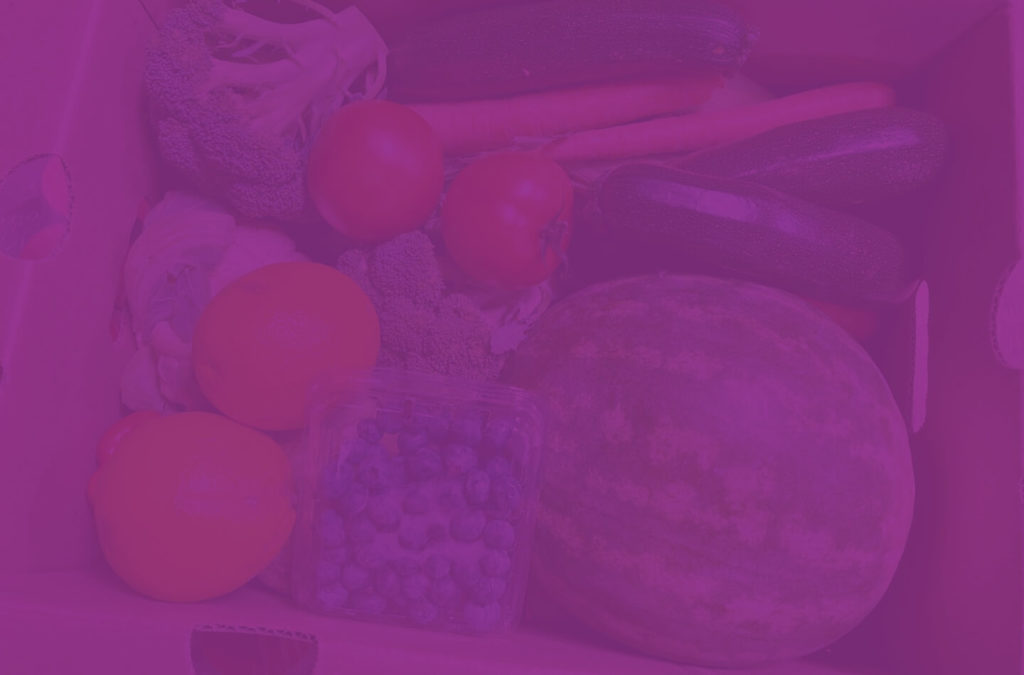
Special Initiatives
In addition to the drive-thru distributions and network of community-based pantries, Food Share distributes food via specialized programs that reach many of Ventura County’s underserved populations.
The Farmwork Resource Program
Provides specialized distributions to farmworkers at their place of work – the fields of Ventura County. More than 4,000 boxes of culturally important foods like masa, fideo, and hominy, plus diapers and feminine care supplies, have been distributed.
Senior Kits
Provide government-funded, shelf-stable food packages and fresh produce to low-income seniors 60+ at 40 distributions each month. During the 2021-22 fiscal year, the number served rose to 6,573 – a 37% increase over FY20-21. An in-home delivery service was also added to reach homebound seniors.
Community Markets
Provide fresh produce each month at mobile locations distributing just under 121,000 pounds of fruit and vegetables during the last fiscal year.
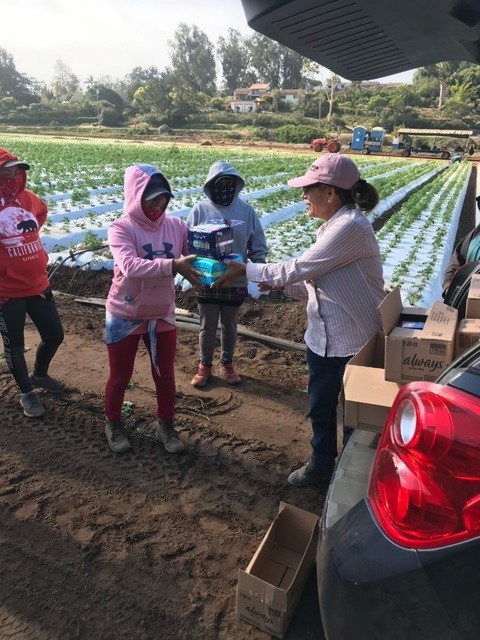
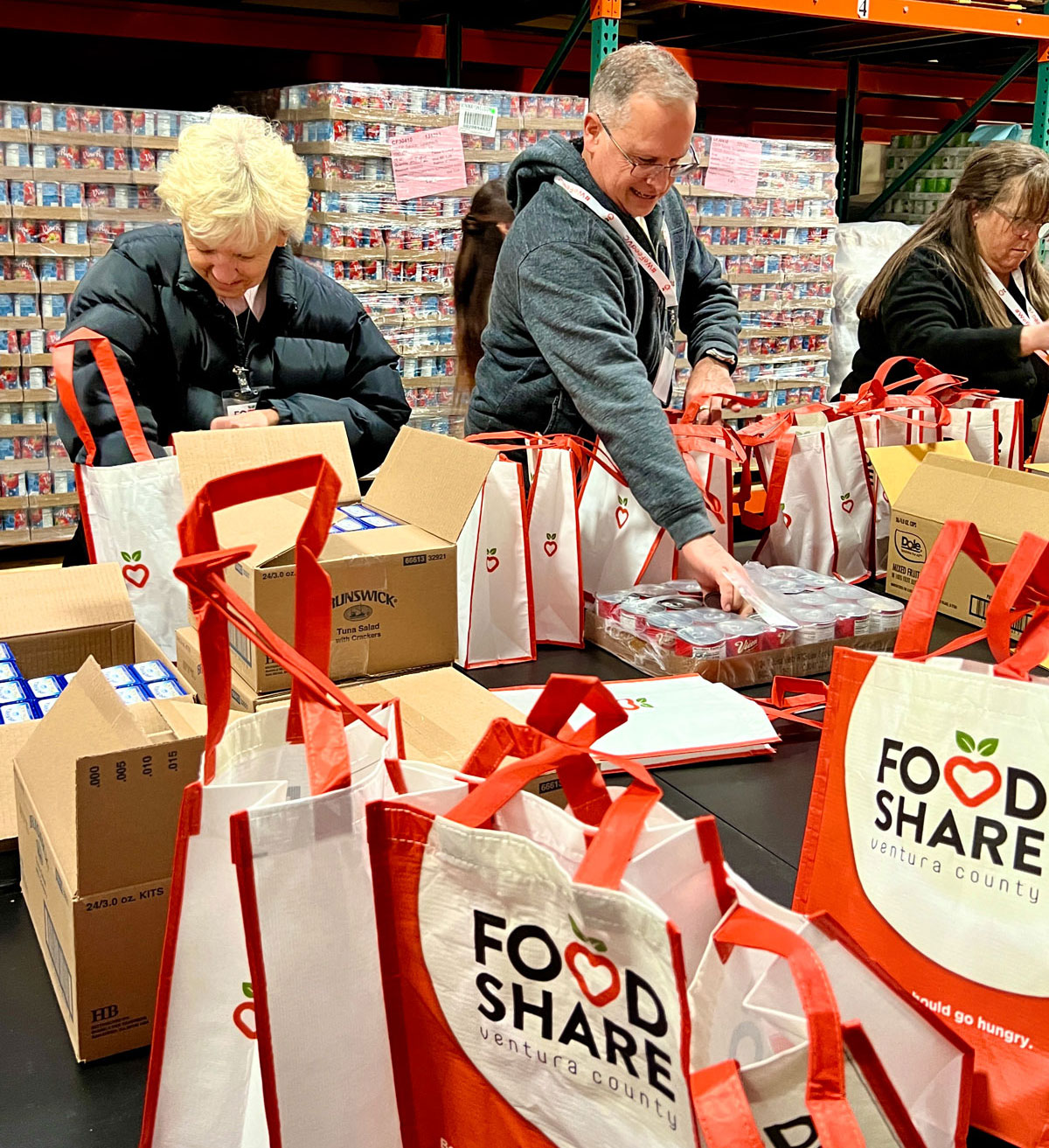
The Kids’ Farmers’ Market Program
Provides nutrition education and fresh produce for kids. After a temporary hiatus due to the pandemic, the program restarted in 2021, serving 2060 children attending after-school clubs.
The Nourishing Neighbors Program
Made possible by grant funding from the Albertsons Pavilions and Vons Foundation, provided boxes of nutritious breakfast foods distributed through Boys and Girls Clubs of America that helped ensure 1640 low-income children in the county had a healthy breakfast.
The Kitchen-Free Program
Provides nutritious food that requires no preparation for people who are unhoused or living in temporary accommodation. 10,829 bags of “kitchen-free” food were distributed in the 2021-22 fiscal year.
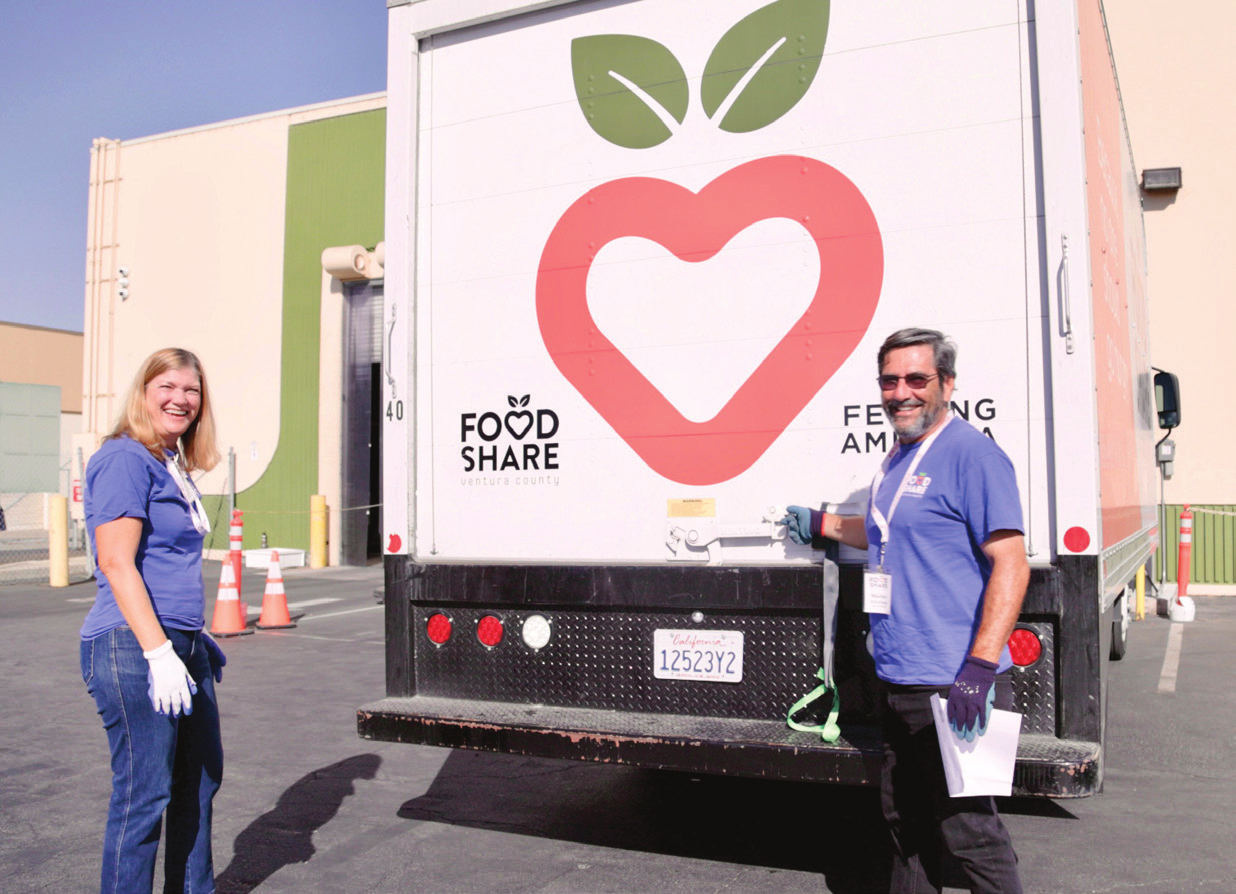
“A lot of times, people are eating poorly because they don’t have the money to buy vegetables and fruits,” observes Gina. “Good nutrition is critical to good health, and so it makes me feel great to volunteer here and be a part of helping families access healthy food.”
Volunteering is a Work of Heart!
Volunteers are essential to Food Share’s ability to serve. In the 2021-22 fiscal year, 3,538 volunteers donated 42,207 hours of their time – the equivalent of 20 additional full-time staff members.
Two of those volunteers are Gina Howey and her husband Walter Burstein, who were busy family doctors in Ventura County before they went into semi-retirement and began volunteering with Food Share in 2020. They do the Monday morning “bread run” each week – picking up unsold food of all types from retail partners like Vons and Ralph’s. The resulting food supplements the bulk staple items that Food Share purchases with a more diverse selection of foods, including bread, meat, and dairy products.
- Cindy Albrecht
- Rick Albrecht
- David Bayer
- Mary Braitman
- John Bravo
- Saurin Chakrabarti
- Herb Courtney
- Dave Curci
- Kurt Dahlgren
- Jerry Dummer
- Chris Ennis
- Duane Epley
- Herb Gandara
- Lynn George
- Pamela Halford
- Joel Hament
- Nella Hauser
- Rick Hauser
- Mary LaBarge
- Mark Laborde
- Gary Luft
- Janis McCann
- Ted Murray
- Kathleen O’Connell
- David Orr
- Richard Poster
- Mary Reed
- Chris Reinhart
- Tim Rogers
- Elaine Rossbach
- Toni Salone
- Linda Smith
- Thomas Smith
- Sandy Stanley
- Dellon Strommen
- Beth Williams
- Sherwin Yip
- Karl Yost
Gleaning Goodness for 45 Years
2023 marks 45 years since Food Share was founded by John and Jewel Pedi and their remarkable group of friends, who came together to help feed seniors struggling with poverty and homeless veterans from the Vietnam War. The group called themselves F.O.O.D Share – Food On Our Doorsteps – an appropriate name for a fledgling organization with a passion for gleaning crops that would have otherwise gone to waste.
Back in 1978, that passion resulted in 34,000 pounds of fresh food. Many things have changed since then, but gleaning is still an important source of fresh produce for Food Share’s clients. During the 2021-22 fiscal year, volunteers completed 219 picks, gleaning 103,350 pounds of oranges, lemons, grapefruit, tangerines, avocado, pomegranate, cucumbers, and jalapeño peppers, among many other crops.
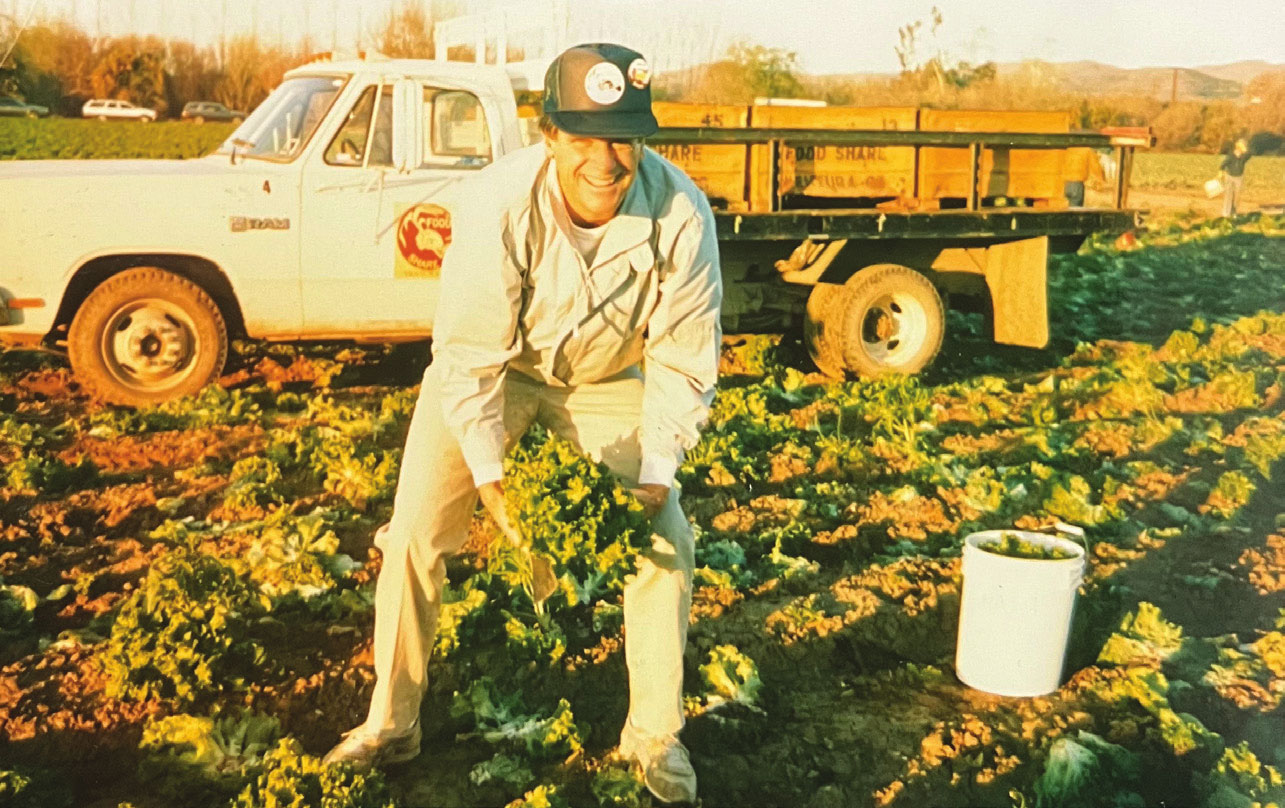
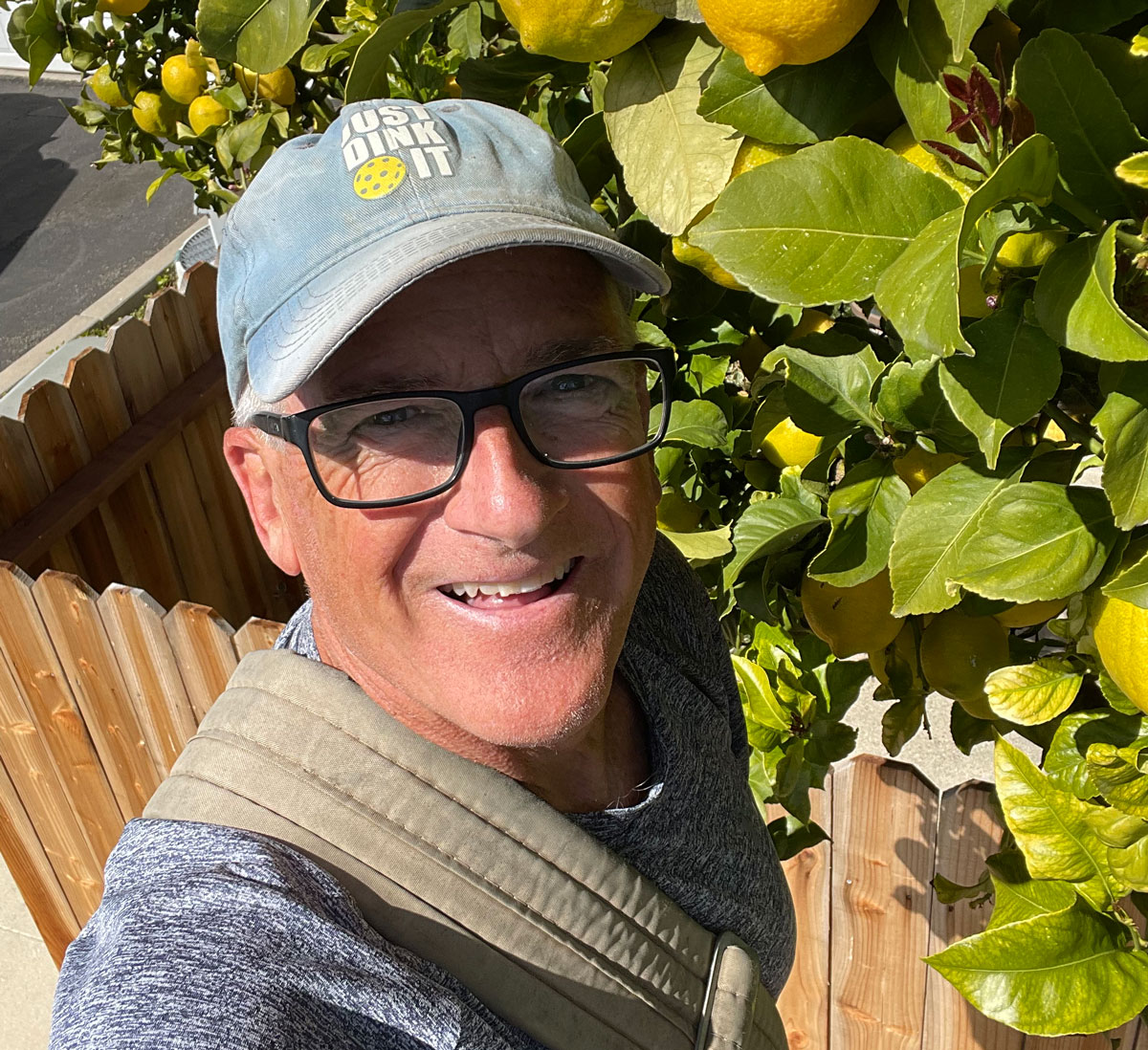
A History Rooted in Gleaning
Today, the gleaning program is run by Dave Orr, a volunteer equally as passionate about saving crops from being wasted. “We are so lucky to live in an area with abundant fresh food, yet so many people in our community can’t afford to buy it at the supermarket,” he notes. “Gleaning gets fresh food that would go to waste onto the tables of people who really need it.”
Dave started gleaning with Food Share about nine years ago. What started as one day of volunteering became a three to four day a week commitment. “I see the gleaning program as a multiple win for all involved,” explains Dave. “First and foremost is the benefit to those who can use the fresh fruit. Next are the gleaners who feel a sense of satisfaction in helping the community. And then the homeowners can feel good about donating their fruit and who also help spread the word about Food Share and its mission.”
What is Gleaning?
Simply put, gleaning is rescuing leftover crops. That might be crops in a farmer’s field, leftover food at a farmer’s market, or fruit on trees in neighborhood backyards. Gleaning leftover crops for the local community was essential to farm life and the harvest process for thousands of years and is even referenced in the Bible.
Gleaning helps farmers and anyone with excess fruit on their backyard trees to reduce food waste. Farms account for 21% of all food waste in the United States. It also helps eliminate squishy, rotting fruits in our local backyards from attracting rodents and insects.
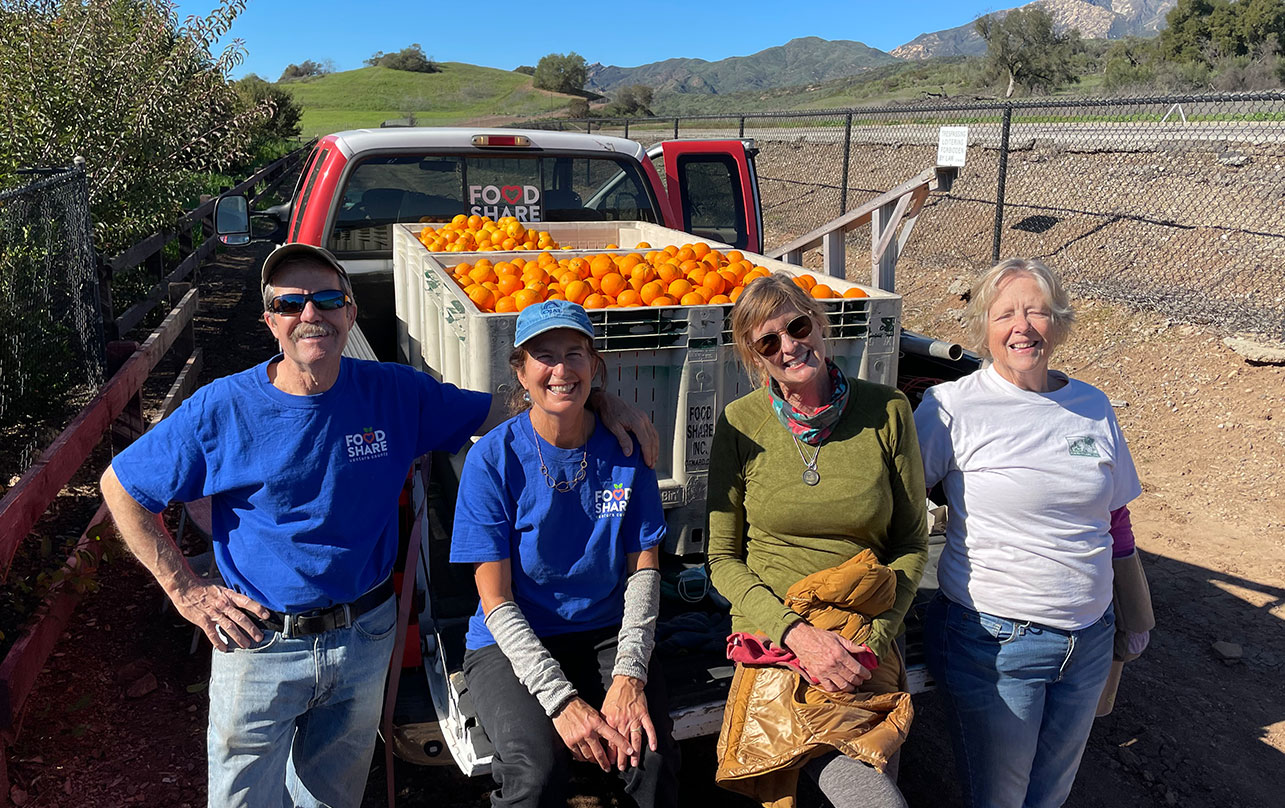
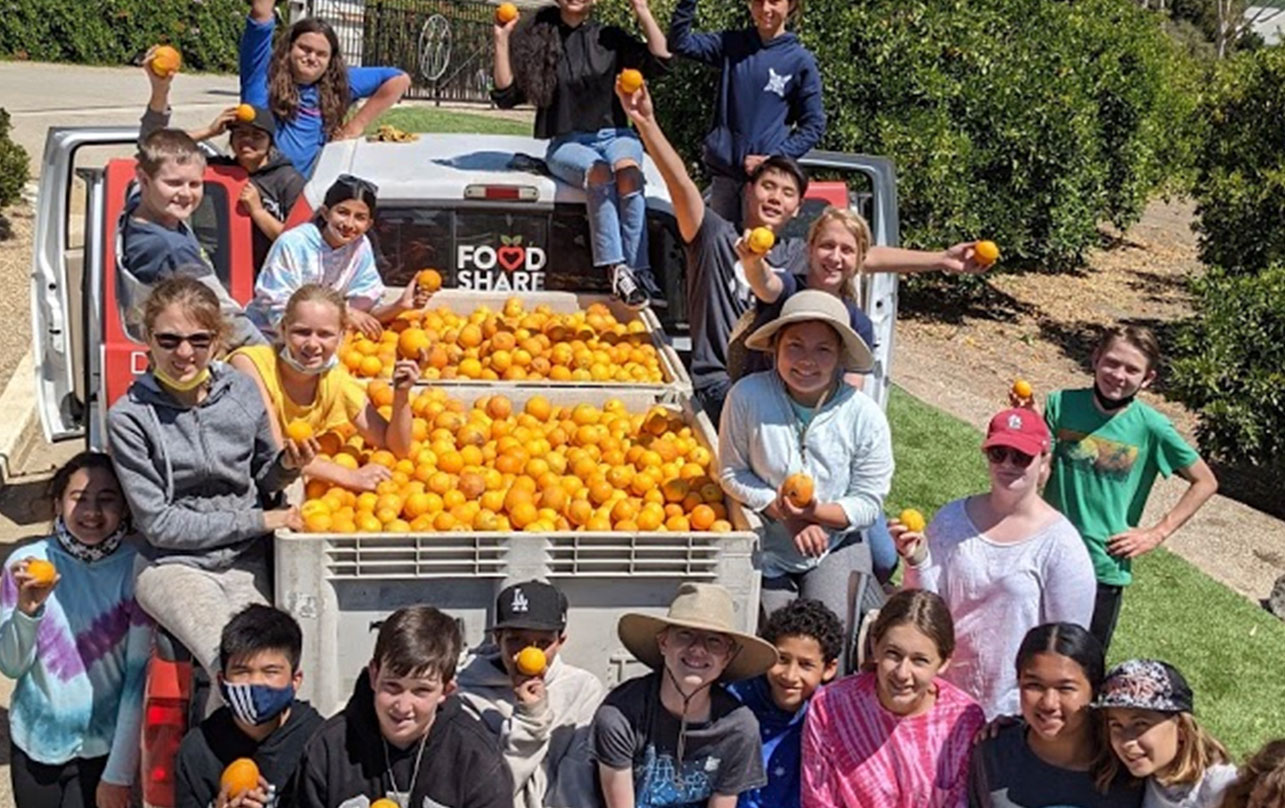
Why is Gleaning important?
Gleaning helps farmers and anyone with excess fruit on their backyard trees to reduce food waste. Farms account for 21% of all food waste in the United States. It also helps eliminate squishy, rotting fruits in our local backyards from attracting rodents and insects.
Have fruit to donate?
Visit foodshare.com/gleaning or call
(805) 983-7100 to schedule a pick today.
Highlights
Despite the restrictions imposed by the pandemic, the Food Share team and a small army of volunteers kept operations rolling along as close to normal as possible.

pounds of food, including 5,248,668 of
fresh produce was distributed

pop-up emergency food box
distributions were held

individuals donated 42,207 hours of their time, or the equivalent of Food Share employing 20 additional, full-time staff members

pounds of food were diverted from
the landfill with financial
support from a CalRecycle grant

boxes of food, containing
1,132,715 lbs of food to 6,573 low
income seniors via our USDA-
funded Senior Kits Program

pounds of fresh produce collected by
our volunteer gleaners in 219
picks including avocados, limes,
and oranges
Food Distribution
Agency Distribution
62%
11,445,394 lbs
USDA Distribution & Senior Kits
22%
4,030,549 Â lbs

Pop-up Distributions
13%
2,520,620 lbs
Other Hunger Relief Programs
3%
518,220 lbs
Total Poundage: 18,514,783
Statement of Financial Position
| Current Assets | $10,540,444 |
| Inventory - Food | $1,894,324 |
| Net Property & Equipment | $4,460,508 |
| Endowment Funds | $1,453,609 |
| Total Assets | $18,348,884 |
Liabilities & Net Assets
| Accounts Payable | $312,398 |
| Accrued Expenses | $258,119 |
| Paycheck Protection Program Loan | $53,226 |
| Net Assets | $17,725,141 |
| Total Liabilities & Net Assets | $18,348,884 |
Board of Directors
-
Drew West, ChairÂ
Retired General Manager, Global Academic Partnerships,
The Trade Desk -
Doug Menges, Vice Chair
Executive Vice President, Many Mansions
-
James Jones, Treasurer
Founder, The JKT Financial Group, LLC
-
Yissel Barajas, Secretary
Chief Human Resources Officer, Reiter Affiliated Companies
-
Shawn O’Hara, Immediate Past Chair
Principal, O’Hara Management
-
Mike Velthoen
Partner, Ferguson Case Orr Paterson, LLC
-
Brad Bartlett
Retired President, Dole Packaged Foods, LLC
-
Scott Burrows
Chief Financial Officer, Arcutis Biotherapeutics
-
Peter Firestone
Senior Managing Director, Protiviti
-
Jed Harris
President, Puretec Industrial Water
-
Nidia Rodriguez
Associate Director of HR, Meissner Corporation
-
Ian Thompson
Senior Vice President, General Manager, Amgen U.S. General Medicine Business
-
Lysa Urban
Marketing Manager, Women’s Economic Ventures
-
Hannah Wirz
Head of North America Product Supply, Bayer


